Cossacks in World War 1812 of the year. Part III. Foreign trip
At the end of December 1812, the Russian armies crossed the Neman and headed to Europe in three columns: Chichagov to Konigsberg and Danzig, Miloradovich to Warsaw, Kutuzov to Prussia. Platov with 24 Cossack regiments went ahead of Chichagov and on January 4 overlaid Danzig. The Cavalry Corps of Wintsentgerod with 6 thousands of Cossacks went ahead of Miloradovich and by the beginning of February came to Silesia. Russian troops took to the line of the Oder. In Bunzlau, Kutuzov fell seriously ill, then died and the emperor began to rule the armies with the help of Wittgenstein and Barclay de Tolly. Napoleon had by that time brought the number of the first echelon of the army to 300 thousand people and on April 26 arrived in the army. He was opposed by a coalition consisting of Russia, Prussia, Sweden and England. The Russian troops occupied Berlin and the army of Wittgenstein moved to Hamburg. Napoleon ordered all corps to move to Leipzig. The Russian-Prussian group of Blucher and Wintzengerode also went there. The battle took place at Lutzen. Blucher showed incredible efforts to break through the front of the French, but did not achieve success and with the onset of the evening the allies decided to retreat. Down the river Spree, Bautzen had a good defensive position, and the Allies decided to give the battle here by troops in 100 thousands of people. To replenish the army of the casualties, Barclay de Tolly was called up from the Vistula with units. For the battle of Bautzen, Napoleon had troops in 160 thousands of people and in the outcome did not doubt. On the morning of May 20, the battle began, the Allies failed and decided to retreat. Emperor Alexander decided to withdraw the army to Poland to clean up. Prussians remained in Silesia. Strong divisions began among the allies, and the coalition began to face disintegration. But Napoleon did not have the strength to continue the offensive. Under these conditions, after many diplomatic delays, 4 June in Pleisnitz was a truce from June 8 to July 22. The official aim of the truce was to find ways to prepare the warring nations for a peace congress with the goal of ending the long-term European war. Austria assumed the role of mediator. But finding a common base for negotiations was not easy. Prussia and Austria demanded from Napoleon complete independence and an important role in European affairs. Napoleon did not take them into account at all and was ready only for a deal with the emperor Alexander, with military force and authority of which he was considered. The terms of the peace negotiations of both sides were known and could not be acceptable to both sides. Therefore, the time of truce, each side tried to use to organize the army and prepare for further struggle. The Allies took measures to win over the countries that were under the yoke of Napoleon. The truce was extended to August 10, but negotiations in Prague also reached an impasse and after the truce began hostilities. Austria has openly declared that it is moving to the Allied side. Napoleon, seeing the failure of an attempt to conclude a deal with Emperor Alexander on the division of spheres of influence in Europe, decided to achieve this by winning. He decided before the Austrian troops joined the Allies, defeat the Russian-Prussian troops, reject the Russians beyond the Neman, then deal with Prussia and punish Austria. During the truce, he strengthened the army and outlined a plan of war. The center of military operations, he took the capital of the Saxon kingdom of Dresden and concentrated in Saxony up to 300 thousands of troops, including up to 30 thousands of cavalry. In addition, parts were allocated for the attack on Berlin numbering more than 100 thousand people. The rest of the garrisons were located on the Oder and Elbe, the total number of Napoleon's army reached 550 thousand people. Allied forces were distributed in the 4 army. The first, consisting of Russians, Prussians and Austrians, numbering 250 thousands of people under the command of Barclay de Tolly was located in Bohemia. It consisted of 18 Don Cossack regiments. The second of the Russians and Prussians under the command of Blucher was located in Silesia and had 13 Don regiments. The northern army under the command of the Swedish king Bernadotte consisted of Swedes, Russians, Englishmen and Germans of the northern principalities, had a population of 130 thousand people, including 14 Cossack regiments. The fourth army of General Bennigsen was quartered in Poland, had a population of 50 thousands, including 9 Cossack regiments, and was in reserve. The bohemian and Silesian armies of the allies took part in the battle for Saxony, the main attack was inflicted by Bohemia. The war began for the French unsuccessful information from the front of Spain. English General Wellington concentrated in Portugal to 30 thousands of people and launched an attack on Spain. With the support of the local population, he defeated King Joseph three times superior, took Madrid, then cleared the whole of Spain from the French.
The battle of Dresden was extremely persistent. Everywhere, the Allies were pushed back and suffered huge losses. The next day the onslaught of the French intensified, and the Allies began a retreat, which occurred under the strong pressure of the enemy. Napoleon triumphed victory. But on this luck the French are over. There were reports that McDonald did not succeed in the battle with Blucher and suffered huge losses. Marshal Oudinot also unsuccessfully attacked Berlin and suffered huge losses. The Bohemian army, retreating from Dresden, scored an unexpected victory over the corps of General Vandamma in the mountains during the retreat, completely taking him prisoner. This inspired the Allies and the retreat to Bohemia ceased. Bernadot, reflecting the attack of the French on Berlin, himself went on the offensive and defeated Udine and Neu. The Bohemian army regrouped and resumed the offensive against Dresden. Combined detachments from Cossacks and units of light cavalry on all fronts went into deep raids in the rear of the French and intensified the actions of partisans from the local population. Seeing all this, Napoleon sent a secret order to the Minister of War to begin organizing a defensive line along the Rhine. The Allies continued the offensive from Bohemia and Silesia, regrouped their forces and launched an offensive in the direction of Leipzig. Napoleon was forced to leave Dresden, and the king of Saxony went into exile. During this retreat a report was received that the Westphalian kingdom fell. When the Cossacks appeared at Kassel, the people rose and King Jerome fled. Westphalia without a fight was occupied by the Cossacks.
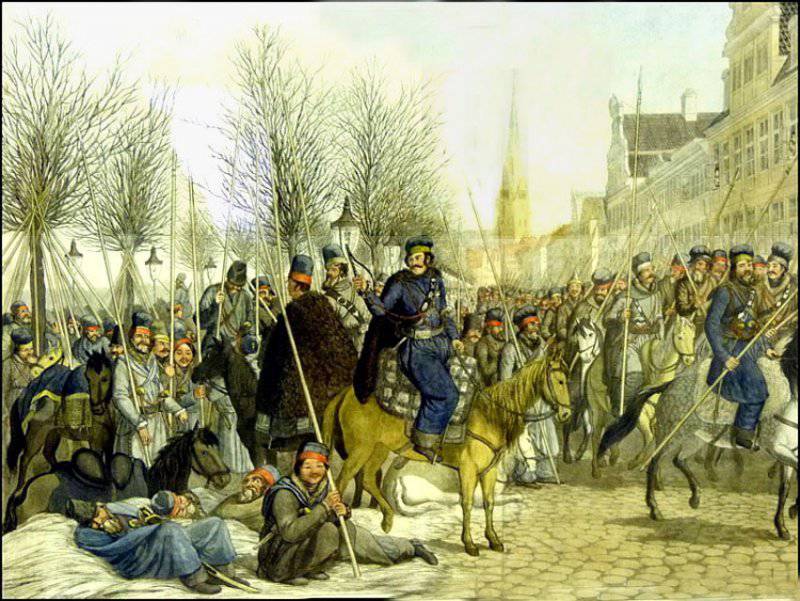
Fig. 1 Cossacks enter the European city
Trouble for Bonaparte continued. Bavaria signed the convention with the coalition and withdrew from the alliance with France. There was a real threat of blocking the withdrawal of the French army beyond the Rhine from Bavaria and Westphalia. However, Napoleon decided to give battle at Leipzig, chose the terrain and outlined a plan for the deployment of their parts. Napoleon concentrated around Leipzig to 190 thousands of troops, allies to 330 thousands. October 4 in 9 hours the battle began. The Allies, deploying troops in the 3 line, went on the offensive after the strongest artillery preparation from 2000 guns. The French artillery was less in number, but in sum, the artillery duel fire reached unprecedented strength. The battle was incredibly fierce, the positions passed from hand to hand, but the French, however, continued to hold the front. At noon, a cannonade in the north was added, which meant the approach and entry into battle of the army of Bernadot, and from the west the Austrians launched an attack on the bridges across the River Pleis to cut off the French retreat to Lutzen. Having received these reports, Napoleon decided to go on the offensive in the center and on his left flank. But everywhere, having suffered great losses, the French did not achieve a decisive goal. Then Napoleon, in order to achieve victory at all costs, threw all the cavalry into the attack. This blow was a complete success, it was necessary to secure it, but this did not happen. Murat's cavalry, which had broken through the center, rested in a marshy floodplain, beyond which large masses of infantry and the Allies observation post, on which were the monarchs of Russia, Austria and Prussia, were out of reach. In the case of a murat cavalry bypass of the marshy floodplain, an immediate threat to the ruling persons was created. Anticipating this, the Emperor Alexander sent a Cossack regiment to the Life Guards who were in his convoy. The Cossacks unexpectedly jumped into the flank of Murat's cavalry and discarded it. The French cavalry of Kellerman, who had broken through on the other flank, were stopped by Austrian cavalry. To support and develop the cavalry efforts, Napoleon wanted to throw the last reserve and parts of the old guard to help them. But the Austrians at this time went into a decisive attack on the crossings at the River Place and Elester and to save the situation Napoleon used the last reserve there. Persistent battles continued until the night without a decisive advantage of the parties, the opponents suffered heavy losses. But in the evening, the reserve army of General Bennigsen approached the Allies and continued the arrival of units of the northern army of the Swedish king Bernadot. The French did not receive replenishment. At night, having received reports from all sides, Napoleon decided to retreat. After receiving reinforcements and regrouping the troops, in the morning of October 6, the Allies launched an offensive on the entire front. Troops supported more 2000 guns. Against Platov's corps, the Saxon corps was located. Seeing the Cossacks and realizing the hopelessness of their position, the Saxons began to go over to the side of the Allies, and by evening they had already fought on the side of the coalition. The Austrians occupied most of the bridges south of Leipzig. On the remaining bridges of the French were incredible congestion, there were disputes and clashes because of the queue. Napoleon himself with great difficulty crossed over to the other side. He saw that not only was this battle lost to them, but the whole Empire was dying before his eyes. The Allies began a decisive battle for Leipzig, parts of Blucher broke through the front, occupied the city and began shelling the bridge on which the French left the city.
The army of the French lost at least 60 thousand people during the crossing. The remnants of the army Napoleon gathered around Lutzen. Instead of taking the army to the line of the Rhine, he decided to resist on the line of the river Ynsrut and began to take up positions there. The main forces of the Allies were in Leipzig, put themselves in order and prepared for a further offensive. However, the advance units, among which were all the Cossacks, continuously pressed, pressed and hung over the retreating enemy, knocked him out of position and forced him to retreat. The retreat of the French took place in the full environment of the allied cavalry. The Cossacks, who had great experience and skill in this matter, quite successfully, and this time, “plundered” the retreating enemy army. In addition to this, Bavaria finally 8 October moved to the side of the coalition and joined with the Austrian units occupied the French withdrawal to the Rhine. For the French army created a new Berezina. After fierce battles for the crossings, no more than 40 thousands of people crossed the Rhine. The departure of Napoleon’s army from Leipzig was also disastrous, as was the retreat from Moscow. In addition, various garrisons to the east of the Rhine left up to 150 of thousands of troops that were inevitably forced to surrender. Military warehouses were empty, there was no armament, the treasury had no money, and the country's morale was in full decline. The people were tired of heavy military service, terrible losses and strove for inner peace, external victories stopped worrying about them, they cost too much. In foreign policy, failures followed one after another. The Austrians attacked Italy, Neapolitan King Murat and the governor of northern Italy, Prince Eugene Beauharnais, held separate negotiations with the coalition. English General Wellington was advancing from Spain and occupied Navarre. In Holland, there was a coup, and the Oran dynasty returned to power. December 10 Blucher troops crossed the Rhine.
Napoleon had no more than 150 thousands of troops available and could not lift the spirit of the people to continue the war. With the retreating army, only the administration left, the people not only did not leave, but waited for salvation from the tyranny of Napoleon. The collapse of Napoleon’s empire was agonizing. He used all his titanic energy to prolong the agony and fanatically believed in his star. In early February, he inflicted a strong defeat on the Blucher army, and captured up to 2 thousands of soldiers and several generals. The prisoners were sent to Paris and passed as trophies along the boulevards. The demonstration with the prisoners did not cause a patriotic rise from the Parisians, and the prisoners themselves did not look like losers, but winners. Other Allied armies successfully attacked, Blucher received reinforcements and also launched an offensive. In one of the battles near Napoleon a bomb fell, everyone around them rushed to the ground, but not Napoleon. Seeing the hopelessness of his position, he sought, like a warrior, to die in battle, but he was destined for something else. Allied armies were approaching Paris. The head of the defense of the capital was appointed Napoleon's brother Joseph, but, seeing the futility of the defense, he left Paris with the troops. When the Allies approached, there was no government in Paris. The most prominent face in Paris was former Foreign Minister Talleyrand. 30 March in a new style, the emperor Alexander and the king of Prussia entered Paris with the troops. After the parade on the Champs Elysees, Alexander arrived at Talleyrand's house, where he stopped. On the same day, a provisional government was formed, headed by Talleyrand, and it was not an accidental choice. About this circumstance should be said separately, because it is one of the most striking pages in stories Russian intelligence. Talleyrand was recruited by Russian agents long before this event, and for many years he served not only Napoleon, but also Emperor Alexander. All these years, the Minister of Police Foucault suspected Talleyrand thoroughly, but could not prove anything.
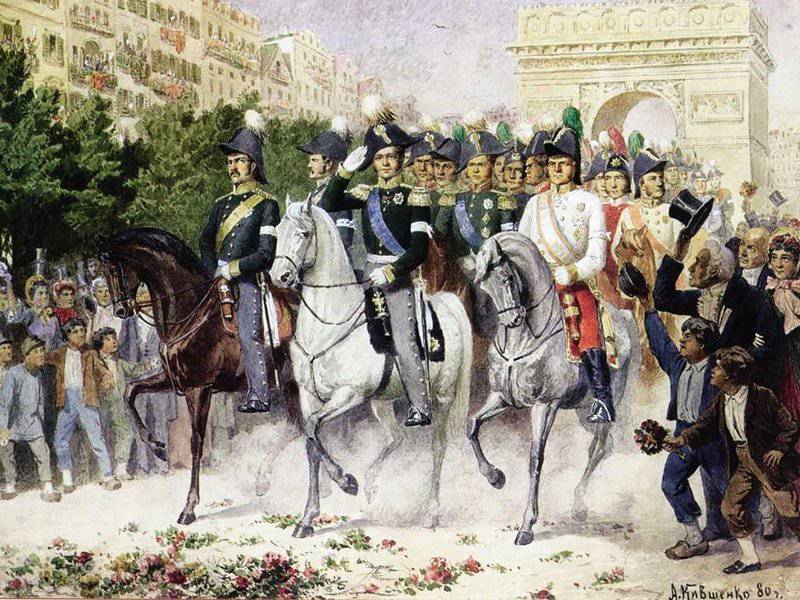
Fig. 4 Emperor Alexander joins Paris
The interim government announced that Napoleon was removed and all power was transferred to the interim government. Napoleon received the news calmly and wrote an act of renunciation. The surviving marshals with the troops one by one began to pass under the authority of the interim government. By decision of the allies, Napoleon was given Elba island for life possession with the title of emperor, the right to have 8 thousand troops and the corresponding content. From the time of the battle of Maloyaroslavets, when Napoleon was attacked by a Cossack and miraculously escaped captivity, he constantly carried poison with him. By signing the terms of the Allies, he took poison. However, the poison was thrown out by the body, the doctor took the necessary measures and the patient fell asleep. In the morning, Napoleon looked tired, but said that “fate did not want me to end my life in this way, which means she keeps me for something else.” On April 18, a new king of France, Louis XVIII, entered Paris, he was greeted by marshals Ney, Marmont, Monseu, Kellerman and Seryurye, and on April 20 Napoleon went to the Elbe.
13 July, Emperor Alexander returned to St. Petersburg. In August, on the occasion of the end of the war, a manifesto was issued, promising to improve the life of the lower classes and ease the most difficult service of the population - the military. The manifesto said: "We hope that the continuation of peace and silence will give us a way not only to keep the warriors content in a better and more abundant state against the former, but to give a settled life and add families to them." There was a thought in the manifesto - to create the armed forces of Russia on the model of the Cossack troops. The internal life of the Cossacks has always served for the Russian government as a tempting example of the organization of the army. In the Cossack regions, military training and constant combat readiness were combined with the position of a peaceful man in the street — a farmer; moreover, military training did not require any effort or expense from the government. Combat qualities and military training were developed by life itself, handed down from generation to generation over the centuries, and thus formed the psychology of a natural warrior. An example of standing troops in a Moscow state was also the Streltsy troops, which were based on the homeless Horde Cossacks that appeared in the XIV century within the Russian principalities. More information about the formation of the Streltsy troops was described in the article “Seniority (Education) and the Formation of the Don Cossack Army in the Moscow Service”. Strelets regiments were organized on the principle of the Cossack troops. The maintenance of them was their allotted lands, on which they lived families. The service was hereditary, the authorities, except for the Streletsky head, were elective. For two centuries, the artillery regiments were the best troops of the Moscow state. At the beginning of the 18th century, the soldiers' regiments, recruiting recruits, replaced the rifle regiments. The maintenance of these troops required large government expenditures, and the recruitment kits were forever tearing off recruits from families. The experience of the formation of new Cossack settlements through the relocation of part of the Cossacks to new places also gave positive results. According to the emperor, the system of military settlements was supposed to improve the lives of the soldiers, enable them to remain among their families and engage in agriculture during the service. The first experiment was made in 1810 year. The war with Napoleon stopped this experience. During the Patriotic War with the best European army, led by a brilliant commander, the Cossacks showed themselves excellently, were highly appreciated by all nations, attracted the attention not only of military organization, but also the organization of their domestic life. At the end of the war, the emperor returned to carrying out his pre-war idea and a broad plan for the creation of military settlements was outlined. The idea was carried out in decisive ways and the shelves were settled by administrative-command method on the allocated lands. Regiments were replenished from their districts. The sons of settlers from the age of seven were enrolled in the number of cantonists, from eighteen to the service in the regiments. Military settlements were exempt from all types of taxes and duties, all provided housing. The settlers handed over half of the harvest to general bread shops (warehouses).
13 September 1814, Alexander went to Congress to Vienna. At the congress, the policies of all European nations, except Prussia, were directed against the increased influence of Russia. While there were disputes at the congress, intrigues and allies were approaching a new political conflict, and the mood of all was now directed against Emperor Alexander, in Vienna in February 1815, information was received that Emperor Napoleon left the Elbe and landed in France, then took the throne when greeting the army and the people. King Louis XVIII fled from Paris and France so hastily that he left a secret Allied treaty on Russia on the table. Napoleon immediately sent this document to Alexander. But the fear of Napoleon changed the mood of the congress and cooled the ardor of schemers and conspirators. Despite the intrigues against Russia, Emperor Alexander remained a loyal ally, and the war against Napoleon resumed. Russia, Prussia, Austria and England pledged to put on 150 thousands of people each, England had to pay allied costs in the amount of 5 million pounds. But luck to Napoleon no longer accompanied. After the defeat of Napoleon at Waterloo in France, the power of Louis XVIII was restored. Russian troops arrived in Paris again after this war against Napoleon was over. Emperor Alexander and Ataman Platov were invited to England, where Cossacks with peaks took special care. Everyone was surprised by the Cossack Zhirov, who did not want to part with pike, even when he accompanied the emperor while sitting in a carriage. Ataman Platov presented the Prince Regent Don horse with a Cossack saddle. The University of Oxford offered a doctoral degree to Platov, and the city of London brought a precious sword. In the royal castle, the portrait of Platov forever occupied an honorable place. Cossack military leaders gained European fame and glory. Cossacks themselves became famous and famous throughout Europe. But for this glory they paid a high price. The third part of the Cossacks who went to war did not return home, having used their bodies to go from Moscow to Paris.
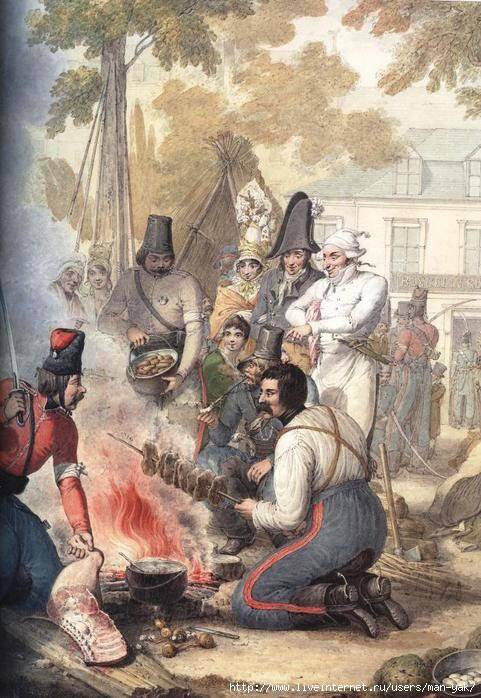
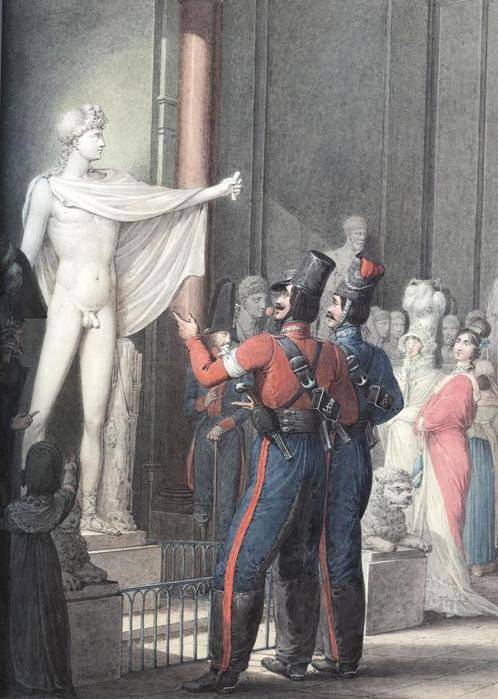
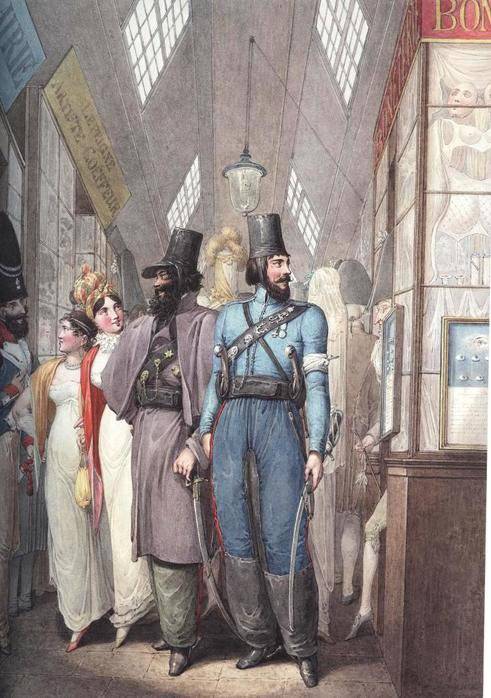
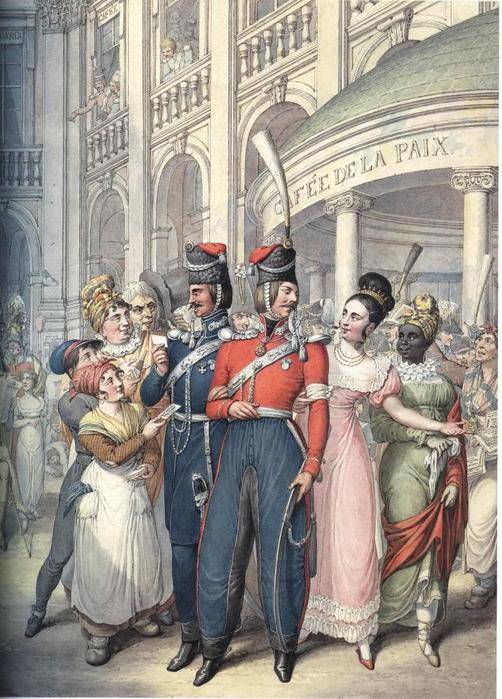
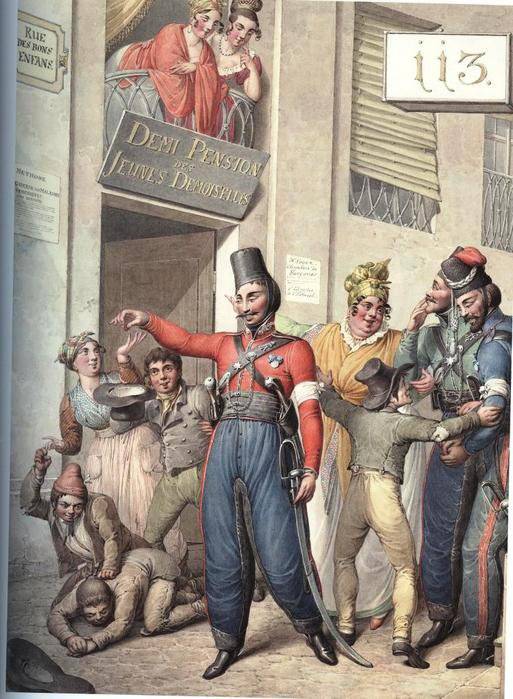

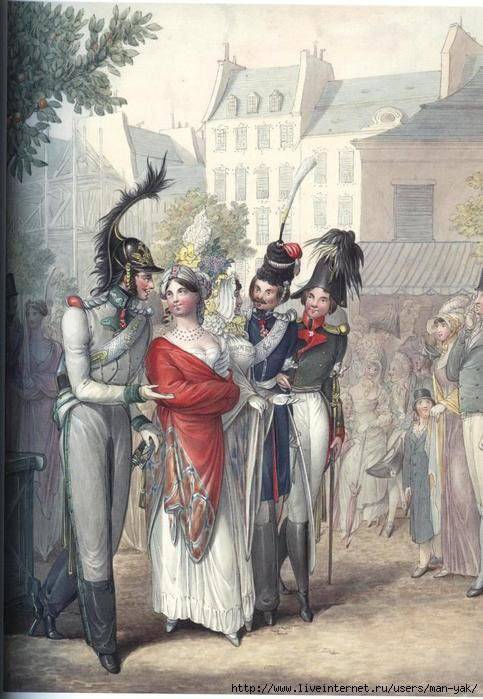
Fig. 5-10 Cossacks in Paris
31 August, the emperor Alexander made a review of the troops in Reims, then arrived in Paris, where the Holy Trinity Alliance was founded between Russia, Austria and Prussia. In December 1815, Alexander returned to St. Petersburg and in the new year began to actively increase the number of military settlements. But the "benefactors" of military settlers sent requests addressed to the emperor, influential persons, agreeing to bear all sorts of duties and pay taxes, but tearfully begging to save them from military service. Discontent was accompanied by riots. However, military officials firmly decided to turn the Slavic inhabitants of the western regions of Russia into Cossacks, without any doubt of success, believing that for this purpose it would be enough by decree to introduce purely external factors of Cossack life. This experience lasted not only in the reign of Alexander, but also during the next reign and ended, both from the point of view of military and economic, and was a complete failure and was one of the main reasons for the defeat in the Crimean war. Possessing on paper more than a million-strong army, the empire could hardly put up at the front several truly combat-ready divisions.
The Cossacks demonstrated a completely different position. Their experience of the formation of new Cossack settlements, through the relocation of part of the Cossacks to new places, was also not easy and smooth, but had extremely positive results for the empire and the Cossacks themselves. In a short time, by historical standards, eight new Cossack troops were created along the borders of the empire. But that's another story.
Materials used:
Gordeev A.A. History of the Cossacks
Venkov A. - Ataman troops of Don Plat (History of the Cossacks) - 2008
ARTICLES FROM THIS SERIES:
Old Cossack ancestors
Education Volga and Yaitsky Cossack Troops
Siberian Cossack Epic
Seniority (education) and the formation of the Don Cossack troops in the Moscow service
Azov seat and the transition of the Don troops in the Moscow service
Cossacks in Time of Troubles
Formation of the Dnieper and Zaporizhia troops and their service to the Polish-Lithuanian state
The transfer of the Cossack army hetman to the Moscow service
Treason of Mazepa and the pogrom of Cossack liberties by Tsar Peter
The uprising of Pugachev and the elimination of the Dnieper Cossacks by Empress Catherine
Cossacks in World War 1812 of the year. Part I, pre-war
Cossacks in World War 1812 of the year. Part II, the invasion and expulsion of Napoleon
Cossacks and the annexation of Turkestan
- Sergey Volgin
- Siberian Cossack Epic
Old Cossack ancestors
Cossacks and the annexation of Turkestan
Education Volga and Yaitsky Cossack Troops
Cossacks in Time of Troubles
Seniority (education) and the formation of the Don Cossack troops in the Moscow service
Azov seat and the transition of the Don troops in the Moscow service
Formation of the Dnieper and Zaporizhia troops and their service to the Polish-Lithuanian state
The transfer of the Cossack army hetman to the Moscow service
Treason of Mazepa and the pogrom of Cossack liberties by Tsar Peter
The uprising of Pugachev and the elimination of the Dnieper Cossacks by Empress Catherine
Cossacks in World War 1812 of the year. Part I, pre-war
Cossacks in World War 1812 of the year. Part II, the invasion and expulsion of Napoleon
Cossacks in World War 1812 of the year. Part III, foreign campaign
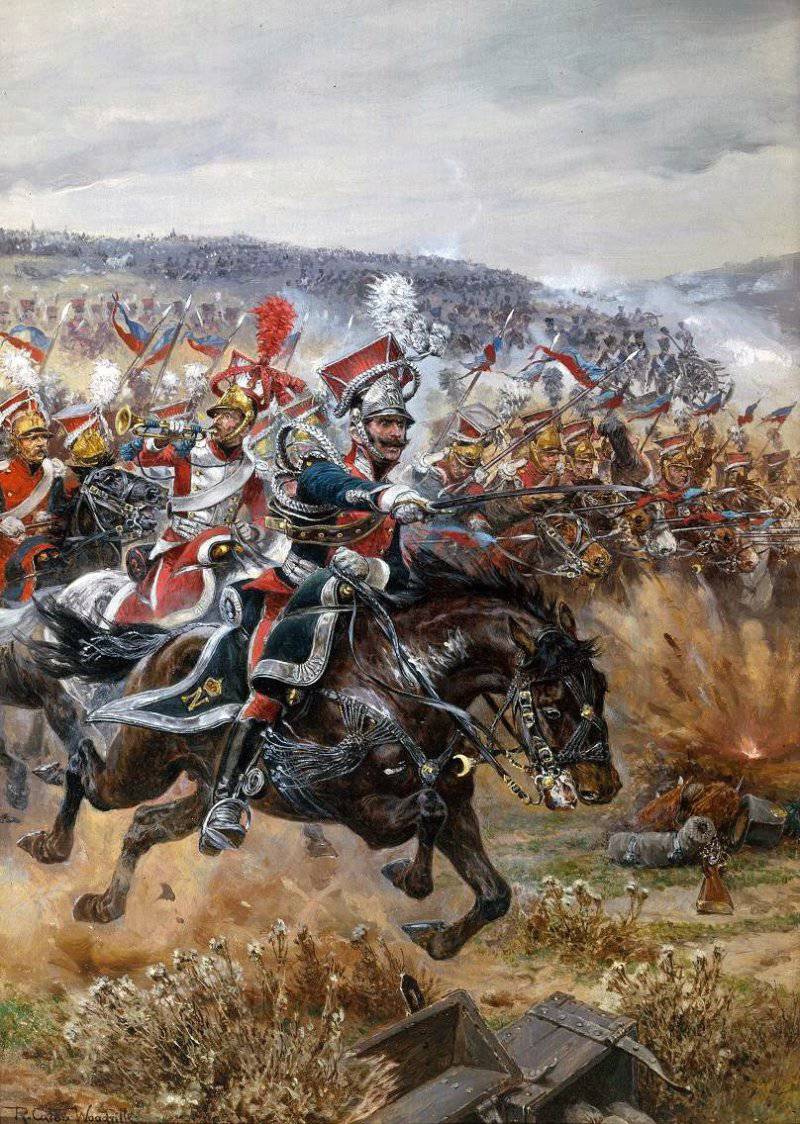
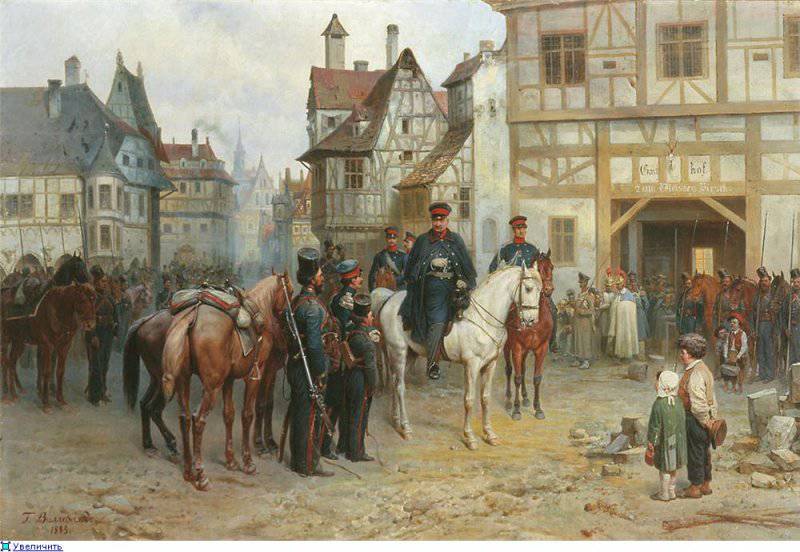
Information